3 Ways to Improve Your Training Programs with Cognitive Learning Theory Tools
BizLibrary
FEBRUARY 21, 2024
What is Cognitive Learning Theory? Cognitive learning theory (CLT) is a psychological perspective focused on the way our brains learn best.
This site uses cookies to improve your experience. By viewing our content, you are accepting the use of cookies. To help us insure we adhere to various privacy regulations, please select your country/region of residence. If you do not select a country we will assume you are from the United States. View our privacy policy and terms of use.

BizLibrary
FEBRUARY 21, 2024
What is Cognitive Learning Theory? Cognitive learning theory (CLT) is a psychological perspective focused on the way our brains learn best.

Ontuitive
AUGUST 5, 2016
Edward Tolman's influential experiments with rats in the 1940's remain highly formative for the field of cognitive psychology, and continue to shape our discussions about learning theory. And, Tolman and his colleagues have offered us the useful analogy of "mapping" for the way information is stored and processed in our brains.
This site is protected by reCAPTCHA and the Google Privacy Policy and Terms of Service apply.

E-Learning Provocateur
JANUARY 12, 2010
Academia is teeming with learning theories. It can be quite a challenge for the modern learning professional to identify an appropriate learning theory, draw practical ideas from it, and apply it to their daily work. Which theory do you choose? How does it relate to other theories? Where do you start?

Matrix
APRIL 29, 2021
Reading is good for the brain. Continuing our series about adult learning theories series that instructional designers should know before creating training courses, we’ll explore experiential learning today. The Theory of Experiential Learning. Take driving, for example. Show me, and I may remember.

Advertisement
Cognitive science theories already supply the answers. Learn how OttoLearn packages them into a single platform you can use to deliver microlearning based reinforcement training, and go beyond completions to focus on outcomes. Learner engagement and retention doesn’t have to be a mystery.

Matrix
APRIL 27, 2021
” moment is both cognitive and emotional. The cognitive system makes use of prior knowledge and experiences all the time. The process of transformative learning. This step includes acquiring new information, taking various perspectives into consideration, and receiving feedback from experts. A true “A-ha!”
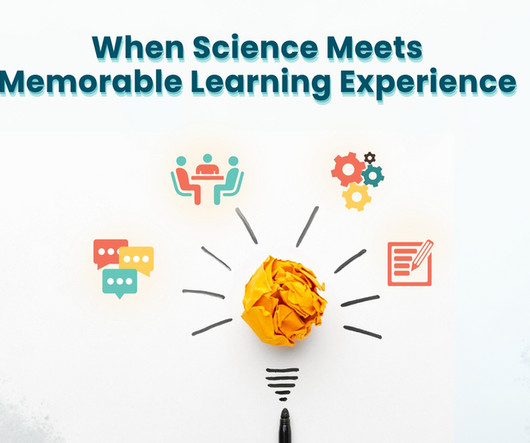
Thinkdom
FEBRUARY 29, 2024
Modern science, especially in learning & development, has come a long way in the last couple of decades. ,, Learning & behavioural sciences overlap more than we initially thought. Let’s first understand how human beings learn and then focus on some strategies that we can use to make professional learning stick.

LearnUpon
AUGUST 27, 2019
There are lots of learning theories out there, but they are not a one size fits all thing. Your learning & development team should investigate the different theories and decide which ones suit the type of training you need to deliver, and the company culture you’re creating . Behaviorist Learning Theory .

HexaLearn
JANUARY 17, 2024
The Psychology Behind Effective eLearning: Comprehending The Mechanics Have you ever pondered how your brain processes information when absorbing something new? This is where cognitive psychology takes center stage in eLearning services. Building On Learning Theories Learning theories serve as guiding stars in eLearning.
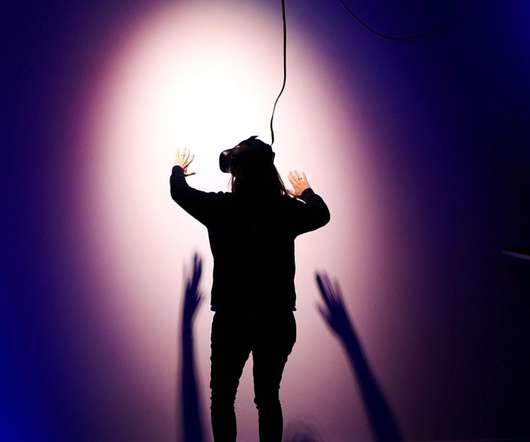
STRIVR
JANUARY 20, 2023
What happens in the brain to master a skill is a complex learning process that involves three distinct stages of motor learning. The brain does this because of past experience, enabling it to act on known patterns and prior information to make split-second decisions. To think about it.

Maestro
JUNE 15, 2023
Others see learning as a road to a better standard of living and seek opportunities to improve their job status or secure professional advancement. Sometimes, adults are learning because they are required to do so for their job. And some learn because they have a cognitive need or curiosity to do so.
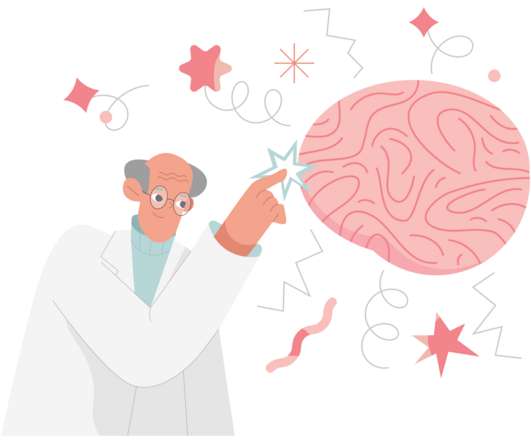
eLearningMind
MARCH 11, 2022
Neurolearning works by integrating learning science and adult learning theory with modern user experience (UX) to create higher engagement with learning material, deepening the understanding of and connection to the learning material. The result?

Integrated Learnings
AUGUST 6, 2013
If you haven’t encountered it lately, it’s possible you’ve forgotten about the recency theory of learning. Recency is the tendency to be more likely to remember information from the end of a sequence. Cognitive theorists believe that as new information enters the working memory, earlier information is pushed out.

The Learning Circuits
JULY 1, 2010
There's been a lot of discussion around cognitive theory and "how the brain learns." But even with all of that discussion there's a question of whether people are really making changes to the design of their online learning. So, it should look like: Tony Karrer - e-Learning 2.0

Learning with e's
SEPTEMBER 26, 2014
This is number 32 in my series on learning theories. Psychologists and cognitive scientists have offered a number of useful theories that aid our understanding of learning. In this series I''m providing a brief overview of each theory, and how each can be applied in education.
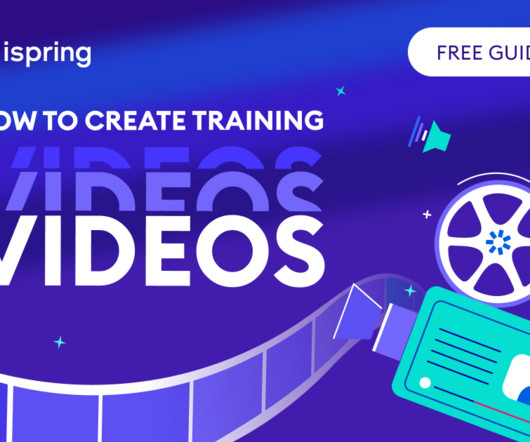
Mike Taylor
DECEMBER 1, 2023
In this one, Connie Malamed explores the effectiveness of animations in learning compared to static graphics. Animations can be effective for visualizing fast or slow processes, yet they don’t always enhance learning due to the cognitive effort required. So, selective use of animations is the key for optimal learning.
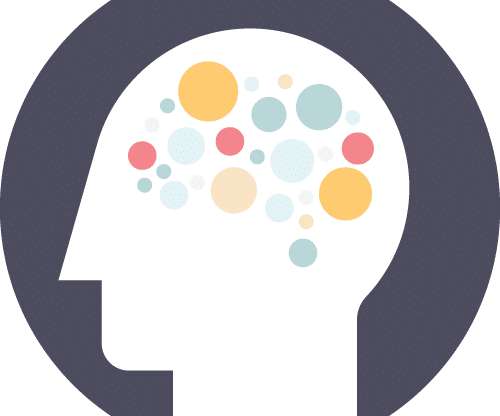
eLearningMind
NOVEMBER 10, 2022
Instead, Neurolearning is a combination of learning theory and neuroscience; a complicated study of how the brain (and the nervous system) works and reacts to stimuli and situations. For our purposes, Neurolearning helps us understand the way individuals learn and how to turn material into memories for later retention.
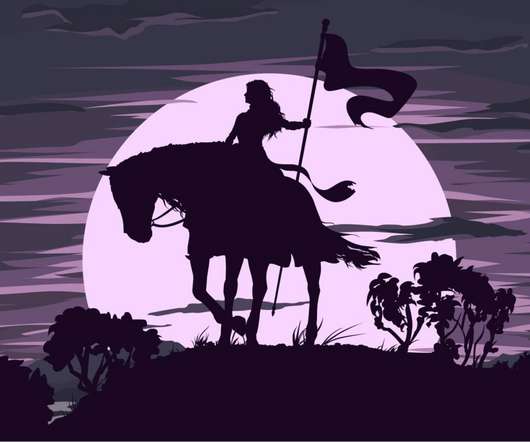
eLearningMind
DECEMBER 19, 2022
This journey elicits an Angel’s Cocktail of chemicals in your learner’s brains—dopamine, oxytocin, and endorphins—making the learning more meaningful and engaging. Even cave paintings are a form of ancient storytelling that passed down useful information from generation to generation. Influence Behavior.

Zipboard
AUGUST 1, 2018
What learning theory would serve the project’s needs best? Instructional Design Strategy - Free ebook for download - zipBoard What Learning Theory Are You Using? As laid out by Wikipedia, learning theories are “Conceptual frameworks describing how knowledge is absorbed, processed, and retained during learning.”

Clive on Learning
NOVEMBER 29, 2007
Chris Brannigan of Caspian Learning alerted me to Cognitive Fitness , an article by Roderick Gilkey and Clint Kilts in the Harvard Business Review, which you can download online for US$6.50. The byline to the article gives you the gist: "New research in neuroscience shows you how to stay sharp by exercising your brain."

Ed App
DECEMBER 8, 2020
Like eLearning, microlearning has been steadily increasing in popularity as workplaces continue to modernize and produce better training styles to experience consistently better learning results. Another reason why the introduction of microlearning has grown at higher rates is because of its learning results.

Learning with e's
DECEMBER 9, 2016
This is number 34 in my learning theories series. Psychologists and cognitive scientists have offered a number of useful theories that aid our understanding of learning. In this series I have been providing a brief overview of each theory, and how each can be applied in education.

Zipboard
AUGUST 1, 2018
What learning theory would serve the project’s needs best? What Learning Theory Are You Using? As laid out by Wikipedia, learning theories are “Conceptual frameworks describing how knowledge is absorbed, processed, and retained during learning.” What Instructional Design model is to be used?

Learnnovators
DECEMBER 16, 2015
That doesn’t mean that my learning from them is more compared to someone who prefers audio. To see our brains as more flexible and open than our preferences (and biases) would suggest. For learning professionals it presents even more opportunities. So where’s the ‘power’ behind the secret? Try auditory.
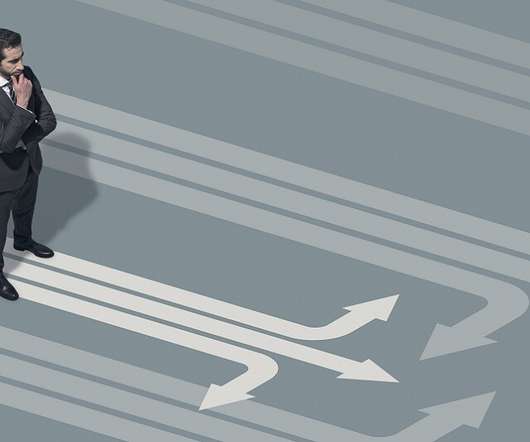
Learningtogo
DECEMBER 13, 2022
The good news is that we’re gaining an influx of talent with a passion for helping people learn, a sound background in learning theory, and a willingness to learn new skills. Adults want to know how new information is important or relevant to them before they will make the effort to learn something new.

Ed App
FEBRUARY 5, 2020
Brain Boost. As an extension of spaced repetition (spaced practice), Brain Boost works to reinforce knowledge already exposed to learners in scientifically calculated increments. The cementation of pre-exposed knowledge reinforces the information, storing it in the long-term memory of learners. Template Library.

Integrated Learnings
JULY 27, 2011
The recency effect tells us that people are more likely to remember information from the end of a sequence. Cognitive theorists believe that as new information enters the working memory, earlier information is pushed out. How can we apply this principle to improve eLearning effectiveness?

B Online Learning
JANUARY 27, 2016
The ability of our brains to process, store and retrieve information has been the subject of much research and debate by cognitive psychologists for a long time. Over that period the terminology used and ideas about how our memory system works have changed as research uncovers new findings.

TalentLMS
DECEMBER 30, 2014
Serious games or serious eLearning solutions take eLearning courses to a higher level of cognitive resonance through emotionally cognizant settings naturally found in games. Emotions create a special state of brain receptivity. Why do you think context-centric learning environments like serious games work?

Integrated Learnings
MAY 3, 2010
I recently read an article called "The Write Brain: How to Educate and Entertain with Learner-Centered Writing" by Kathleen M. Here's how she addresses those opening questions: By blending fictional and technical writing techniques with learning theory, we can craft written materials that both educate and entertain.

Ed App
JANUARY 7, 2022
The theory of instructional scaffolding has been developed by cognitive psychologist Jerome Bruner in the 1950s (Ninio, Bruner, 1978). He and his student analyzed picture books designed for joined reading for children and parents and determined, how parental instruction help to develop cognitive skills in children.

PulseLearning
DECEMBER 18, 2017
When it comes to designing engaging and effective corporate training, the best place to start is by looking at how the human brain works – neurology. Just like vehicles need the right type of fuel to run smoothly, your brain requires the right input to for its learning processes to work as efficiently as possible.
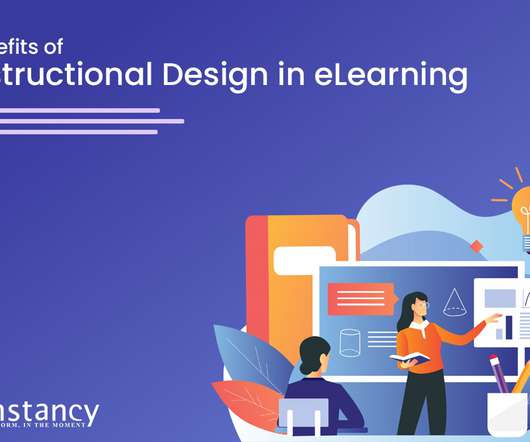
Instancy
APRIL 14, 2021
Instructional design bridges the two, keeping learning at the centre while designing and developing an eLearning course. Very large number of people around the world are now taking eLearning courses in both, formal and informal ways. How best can the course be evaluated to know if it is meeting the learning goals?

Ed App
DECEMBER 8, 2020
Like eLearning, microlearning has been steadily increasing in popularity as workplaces continue to modernize and produce better training styles to experience consistently better learning results. Another reason why the introduction of microlearning has grown at higher rates is because of its learning results.

Learning with e's
JUNE 4, 2014
A 3D Printed version of the Penrose Triangle This is number 14 in my series on learning theories. I''m working through the alphabet of psychologists, providing a brief overview of each theory, and how it can be applied in education. This theory explains the confusion we sometimes experience when we see an optical illusion.

KnowledgeOne
APRIL 14, 2021
The basis of social-cognitive theory. This notion is at the heart of his social-cognitive theory, which explains human development and functioning through continuous and reciprocal interactions between personal, behavioural and environmental (or contextual) factors.

CDSM
AUGUST 27, 2015
Conceived between 1949 and 1953 by a committee of educators, the original Bloom’s taxonomy identified a number of cognitive levels at which humans can function. Though this taxonomy of the cognitive domain was revised by Anderson and Krathwohl in 2001, the visual metaphor of the step pyramid was still prevalent. Shelley Wright.

eFront
JUNE 8, 2017
By embedding instructions in familiar contexts, learners are more likely to learn Click To Tweet. 2) “Real world” application: Rather than teach for the abstract or theoretical world, using contextual learning strategies helps companies prepare their employees to take on real-world challenges that their staff faces in the workplace.

Rapid eLearning
DECEMBER 1, 2009
In a previous post, I shared a little about cognitive load and how to get your learners to remember more. Background audio might conflict with other information. Adding too much information at once might overload the brain’s processing. This impacts how well the learner can recall the information in the course.

Learning Visions
AUGUST 23, 2007
Itiel Dror who discusses the brain and e-Learning. Dr. Dror is a cognitive scientist, who urges instructional designers to keep the focus on the learner rather than the learning materials and to design the learning experience to the human brain. Get into the learners shoes.

Learnnovators
APRIL 18, 2014
ABOUT CLARK QUINN (Learning Technology Strategist): Clark Quinn, Ph.D., helps organizations align technology with how we think, work, and learn. You say ‘most L&D really seems stuck in the Industrial Age, but we’re working in the Information Age’. What are your experiences?

Learning Pool
JULY 21, 2020
When blended learning first appeared it felt to some like an inelegant fudge designed to save trainers’ jobs. But there quickly appeared a succession of newly-minted buzzphrases – informal learning, social learning, game-based learning, mobile learning, 70:20:10, learning architectures, etc.

Experiencing eLearning
OCTOBER 8, 2009
But where it differs is, crucially: the transfer of information does not reduce to this physical substrate. Contrary to the communications-theoretical account, the new theory is a non-reductive theory. “Instead of viewing brain areas as being specialized for specific representational content (e.g.,

Obsidian Learning
MARCH 1, 2016
New post 6 Best Practices For Applying Spaced Learning In Online Training on Obsidian Learning. Are you concerned about cognitive overload undermining the effectiveness of your online training program? The secret is to offer the mind a respite from the subject matter so that it can assimilate and reflect upon the information.
Expert insights. Personalized for you.
Are you sure you want to cancel your subscriptions?


Let's personalize your content